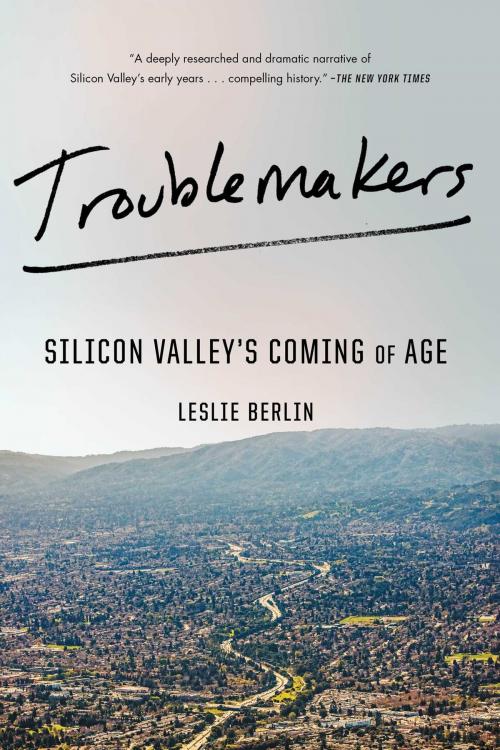Troublemakers
Silicon Valley's Coming of Age
Nonfiction, Science & Nature, Technology, Business & Finance, History| Author: | Leslie Berlin | ISBN: | 9781451651522 |
| Publisher: | Simon & Schuster | Publication: | November 7, 2017 |
| Imprint: | Simon & Schuster | Language: | English |
| Author: | Leslie Berlin |
| ISBN: | 9781451651522 |
| Publisher: | Simon & Schuster |
| Publication: | November 7, 2017 |
| Imprint: | Simon & Schuster |
| Language: | English |
Acclaimed historian Leslie Berlin’s “deeply researched and dramatic narrative of Silicon Valley’s early years…is a meticulously told…compelling history” (The New York Times) of the men and women who chased innovation, and ended up changing the world.
Troublemakers is the gripping tale of seven exceptional men and women, pioneers of Silicon Valley in the 1970s and early 1980s. Together, they worked across generations, industries, and companies to bring technology from Pentagon offices and university laboratories to the rest of us. In doing so, they changed the world.
“In this vigorous account…a sturdy, skillfully constructed work” (Kirkus Reviews), historian Leslie Berlin introduces the people and stories behind the birth of the Internet and the microprocessor, as well as Apple, Atari, Genentech, Xerox PARC, ROLM, ASK, and the iconic venture capital firms Sequoia Capital and Kleiner Perkins Caufield & Byers. In the space of only seven years, five major industries—personal computing, video games, biotechnology, modern venture capital, and advanced semiconductor logic—were born.
“There is much to learn from Berlin’s account, particularly that Silicon Valley has long provided the backdrop where technology, elite education, institutional capital, and entrepreneurship collide with incredible force” (The Christian Science Monitor). Featured among well-known Silicon Valley innovators are Mike Markkula, the underappreciated chairman of Apple who owned one-third of the company; Bob Taylor, who masterminded the personal computer; software entrepreneur Sandra Kurtzig, the first woman to take a technology company public; Bob Swanson, the cofounder of Genentech; Al Alcorn, the Atari engineer behind the first successful video game; Fawn Alvarez, who rose from the factory line to the executive suite; and Niels Reimers, the Stanford administrator who changed how university innovations reach the public. Together, these troublemakers rewrote the rules and invented the future.
Acclaimed historian Leslie Berlin’s “deeply researched and dramatic narrative of Silicon Valley’s early years…is a meticulously told…compelling history” (The New York Times) of the men and women who chased innovation, and ended up changing the world.
Troublemakers is the gripping tale of seven exceptional men and women, pioneers of Silicon Valley in the 1970s and early 1980s. Together, they worked across generations, industries, and companies to bring technology from Pentagon offices and university laboratories to the rest of us. In doing so, they changed the world.
“In this vigorous account…a sturdy, skillfully constructed work” (Kirkus Reviews), historian Leslie Berlin introduces the people and stories behind the birth of the Internet and the microprocessor, as well as Apple, Atari, Genentech, Xerox PARC, ROLM, ASK, and the iconic venture capital firms Sequoia Capital and Kleiner Perkins Caufield & Byers. In the space of only seven years, five major industries—personal computing, video games, biotechnology, modern venture capital, and advanced semiconductor logic—were born.
“There is much to learn from Berlin’s account, particularly that Silicon Valley has long provided the backdrop where technology, elite education, institutional capital, and entrepreneurship collide with incredible force” (The Christian Science Monitor). Featured among well-known Silicon Valley innovators are Mike Markkula, the underappreciated chairman of Apple who owned one-third of the company; Bob Taylor, who masterminded the personal computer; software entrepreneur Sandra Kurtzig, the first woman to take a technology company public; Bob Swanson, the cofounder of Genentech; Al Alcorn, the Atari engineer behind the first successful video game; Fawn Alvarez, who rose from the factory line to the executive suite; and Niels Reimers, the Stanford administrator who changed how university innovations reach the public. Together, these troublemakers rewrote the rules and invented the future.















